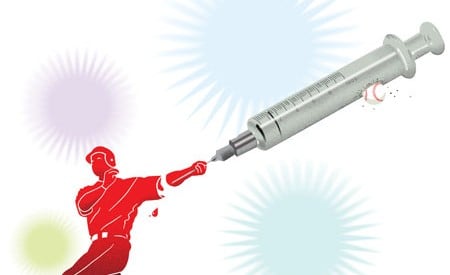Should performance-enhancing drugs be legalized? Our experts debate.
YES
In theory, banning doping prevents athletes from taking unfair shortcuts and keeps sports on a level playing field. In reality, these bans have done less to protect fairness and punish rule-breakers and more to discourage athletes from reaching the highest levels of success.
Lance Armstrong, the face of doping to many, is an example of the flawed logic behind bans. Yes, Armstrong had an advantage because of his illegal activities. But is it really an unfair advantage if the majority of your competitors are also using performance enhancing drugs (PEDs)? According to Business Insider, 20 out of 21 top three Tour de France finishers from 1999 to 2005 were taking PEDs, and 36 of 45 top three finishers from 1996 to 2010 were also doping. While “everybody’s doing it” might not fly in a kindergarten classroom, sports can and should have an internal standard of behavior. The current bans simply don’t work, and keep rule-following athletes from being competitve with their peers.
Sports are constantly evolving. Walter Payton wasn’t training with world-class coaches in state-of-the-art facilities when he dominated. Babe Ruth wasn’t drinking Gatorade or using creatine when he amazed his fans. We don’t ban the advantages that modern day athletes have over their predecessors, and that attitude of progress should apply across the board. Getting a better night’s sleep can enhance performance. Eating a healthy breakfast, taking vitamins and supplements, training harder or simple genetic advantages—there are countless factors that contribute to sports being “unfair.” But that’s the whole point of competition.
How many people would have cared about the Tour de France without Armstrong’s stunning feats? Before failing a drug test in 2006, Shawne Merriman was in highlight reel upon highlight reel during his 2005 season as the NFL Defensive Rookie of the Year. Who can deny the excitement of 1998’s record-breaking MLB home run chase between Mark McGwire and Sammy Sosa? Recently busted Alex Rodriguez is a career .300 hitter with 647 career homeruns, a 14 time all-star, a 3 time AL MVP and a World Series Champion.
We can continue the trend of hand-wringing and hysteria, with one doping scandal after another, further embarrassing the field of professional athletics – or we can legalize and regulate performance-enhancing drugs to the benefit of sports and sports fans alike. Let’s do ourselves and our athletes a service by allowing them to perform at their best.
Mac McCann is a columnist for The Horn at the University of Texas-Austin.
NO
Americans love high performance and we love technology. Why, then, do we get our knickers in a twist when professional athletes—think Lance Armstrong or A-Rod—turn out to have achieved their great feats with a boost from performance-enhancing drugs and other banned technologies?
Not everyone turns up their nose when a high-profile athlete dopes. Some offer excuses: the pressure to perform is overwhelming, and the rewards are too tempting to resist. We allow special diets, scientifically optimized training, and novel equipment, so why ban drugs, or, in Lance’s case, bags of whole blood? Aren’t they all just technologies intended to produce outstanding performances? In some sports in some eras, nearly every competitor was doping: how else could an athlete have a shot at winning?
That last argument—everyone does it, so I’m just leveling the pharmaceutical playing field—provides half of the answer. When I first asked elite athletes more than 30 years ago why drugs were being used, the answer was unequivocal: Whatever reservations you might have, no one wants to give up a competitive advantage, especially to someone who might not be as talented or dedicated as you but can get enough of an edge from drugs to beat you.
That story of a drug race spiraling ever upwards, much as the arms race drove nations to build more and deadlier weapons, is one of the best reasons to ban doping in sports. It doesn’t end with the pros either. Amateur athletes, including high school and perhaps younger participants, look to their heroes for examples of how to succeed in sport. If doping was allowed, we could expect non-elite athletes to pursue the latest advances in performance enhancing drugs just as they buy the latest running shoes, bikes, or tennis rackets. In no universe is this a healthy development. Pros and those who emulate them will be driven to use drugs in doses and combinations no scientist has ever studied.
Doping in pro sports is a useful prod that forces us to ask what sport is all about anyway? Why do we play? When we see an exceptional performance, when we experience one of those moments of grace and excellence in ourselves, what makes it so special? If excellence in sport is the intersection of talent and dedication, as I believe, then drugs distort and distract. eOur shared understanding of the meaning and value of sport will determine whether doping should continue to be banned. That decision is up to all of us.
Thomas Murray is the president emeritus of the Hastings Center, a non-profit bioethics research institute.








